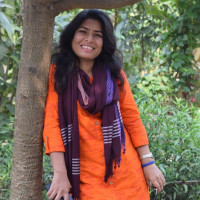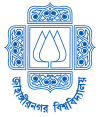
Aklima Akter Assistant Professor, Department of Anthropology
PROFILE
SHORT BIOGRAPHY
Aklima Akter is an Assistant Professor at Department of Anthropology, Jahangirnagar University. Previously, she accomplished different gender based research and programmes with BRAC and ICDDR'B. .
RESEARCH INTEREST
Gender & Gender based Politics, Social Inequality, National and Global Politics.
JOURNAL PAPER
Aklima Akter, Repressions occurring to women's body: Exploring the body politics of the society, Nrvijnana Patrika-Journal of Anthropology, 26, pp.111-122, 2021.Women of Bangladesh are emerging out of domestic spaces and engaging themselves in different sectors of economic, social and other forms of development. Sometimes this involves managing their family without the involvement of any male members. But still societal perception regarding the status of women is connected with their bodies in this society and women struggle to attain any sort of control over their own bodies. Rather patriarchal state, society control their bodies through different types of laws, regulation and violence. These oppressions occur not only among households or within marriage rather in workplace, educational institutions, and different public places also. State and society validate these oppressions through their laws and regulations. But women are not just receiving these, rather resisting through their everyday actions and sometimes bargaining with those by accommodating another patriarchal ideology.
Aklima Akter, Women's access to the laws of Bangladesh and the scope of CEDAW, The Jahangirnagar Review, 46, 1, pp.103-115, 2022.Law and culture both play a major role in social organisation and political structure; both impacts substantially on women. But the prevalent patriarchal mindset hampers the even-handed dealing between sexes and eliminating discrimination against women. Existing various laws validate those discrimination and limit women's access to it. Even though CEDAW is effective to reduce discrimination from laws and policies, but government is less poised to accept the CEDAW principles removing discriminatory laws and policies excusing discriminatory laws are based on religious norms. Luckily, hope exists to eradicate discriminative policies and establish CEDAW through gradual bargaining with the state which I have tried to explore through my writing based on secondary sources.
Akter, Aklima, “Coming Out From Pan and Jumping Into Oven”: Divorce and Societal Ideology about Divorced Women, The Jahangirnagar Review, 41, pp.355-364, 2020.Muslim Marriages and Divorces Registration Act 1974 is the reflection of our patriarchal society and according to this act husband has exclusive right to divorce his wife at any time and showing any reason, but wife will be able to divorce when she gets that right to divorce her husband from her husband, and she should have to face and also prove few reasons. Divorce is not the end but all the trauma starts from here for a woman. One of my female respondents have said, “Leaving a marriage is possible but does marriage leave someone in her entire life?” When a woman is getting divorce she is being denoted as ‘divorced’ by everyone, whenever she is going out or a ceremony everyone is busy to get her a groom or to listen to her story of getting divorce or blaming her for getting divorce. This scenario is very rare for a divorced man in our society, which is the reflection of patriarchy.
Akter, Aklima, Property Distribution : Diversified experience of bengali muslim women (In Bengali), Nrivijnana Patrika (Journal of Anthropology), 21, pp.1-16, 2016.Every state has its own formal laws following which properties are supposed to be distributed among the heirs. However, in practice, established laws are not the only determinent of inheritance system in a society. Along with state enacted laws, there are different traditions, customs, beliefs, rules and regulations that play key roles in giving shape to practices relating to property distribution. Such coexistence of diverse laws and customs means that a person has to go through complex experiences while a decision of property distribution is made. In fact, the conception of property itself is contingent to social and cultural realities. Drawing on empirical data, this write-up shows how power struggle over the question of inheritance is informed by diverse factors. Relational dynamics within the households, relative effectiveness of techniques and strategies employed by stakeholders, traditional norms, plays of tricks, and others are among such factors. However, the institution of patriarchy is perhaps the most powerful among the determinants of inheritaence of property among Bengali Muslims. Muslime women in Bangladesh seek to employ various strategies to make sure they get access to the property on which they are entitlement; However, in most of the cases they give up to the politics that derives the from patriarchal settings.
BOOK CHAPTER
Akter, Aklima, Social validation of sexual harassment (In Bengali), Women in Bengali society and culture, pp.251-262, 2019.Sexual harassment is a very common concept to us and women from every sphere are facing it, may be in different level and in different forms. Though it is very well known, happening to women everyday, people are talking about it, different media are vocal about it but sexual harassments are happening everyday as usual. The reason of this continuation is hidden in our society actually where it is constructed, validated and sustained by the society itself. Our society has constructed some charachteristics of men and women and it wants them to act or behave like so. It has consructed some masculine charachteristics where men have to be brave, bold, strong and also a ‘sexual harasser’ that’s why when a man is harrassing a girl sexually then society is blaming and shaming the girl or women but not that man for harassing her. Also society validates this kind of behavior of men by saying these are ‘fun’ or ‘nothing’ or ‘it is natural for men to do these’ etc. This is a tool of patriarchy to control the women or girl coming to public spaces of the patriarchal society too. That’s how sexual harassment is validated by the society and women are controlled by these as usual.
Contact
Aklima Akter
Assistant Professor
Department of Anthropology
Jahangirnagar University, Savar, Dhaka-1342, Bangladesh.
Cell Phone: +8801915065018
Work Phone: +8801915065018
Email: aklima.ripa@juniv.edu
, aklima752@yahoo.com

